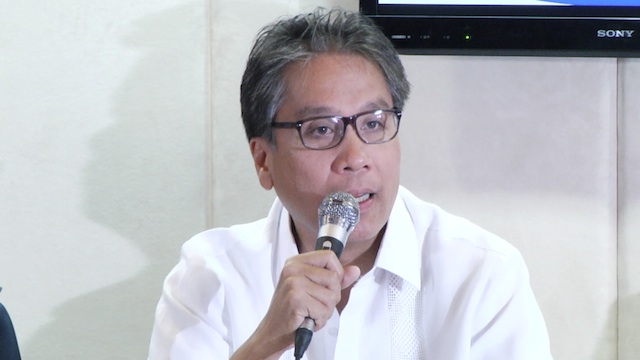SUMMARY
This is AI generated summarization, which may have errors. For context, always refer to the full article.

MANILA, Philippines – Were this year’s barangay elections more violent than the last?
Not so fast, said the Philippine National Police (PNP).
A day after the nationwide village elections, the PNP said on Tuesday, October 29, that while it recorded a higher number of politically-motivated violence during the election period of September 28 to October 28, they have yet to be validated by the police.
During that period, the PNP recorded 46 total incidents of election-related violence, including 24 on election day itself.
The 2010 barangay elections had 22 total incidents.
But PNP Deputy Director General Felipe Rojas Jr said the PNP was expecting lower numbers this year. In 2010, he said there were initially 78 suspected politically-motivated incidents (PMI) initally, but only 22 were validated.
He said based on that trend, the 46 suspected incidents that have been reported will likely yield a smaller number once they have all been validated.
“The conduct of the 2013 Barangay Elections is generally peaceful. Although there was an increase in the recorded, suspected PMIs compared to the previous barangay elections, it is expected that it will be lowered after validation,” he said.
Of the 46, Rojas also said 39 were victims of shooting, 1 of strafing, 3 of stabbing, while 3 were victims of other forms of violence.
The PNP said 25 total were killed, including 9 who died on election day — one victim each in Regions 2,5,8 and Metro Manila, and 5 in the Autonomous Region in Muslim Mindanao (ARMM), which is notorious for violence during the election season.
Of the 25, at least 11 were elected government officials, 11 were supporters, and 3 were candidates.
Interior Secretary Mar Roxas vowed justice for the victims, saying he has tasked “chiefs of police to prioritize the case of the 25 who died.” He called the deaths “senseless,” citing one case was of an incumbent barangay chairman in Capiz shooting his brother after the latter defeated him in the polls.
While villages are the smallest government units, they are hotly contested because they serve as the connection for major political parties to cultivate their grassroots network and widen their support base.
This year, about 42,000 barangays held polls, with 6,216 barangays identified by the police as priority areas.
Fear, danger
The PNP said a total of 644 persons have been arrested for violating the gun ban, while 539 firearms were confiscated. The police also confiscated 68 grenades.
Another 220 were arrested for violating the liquor ban.
On election day, the PNP said it deployed at least two personnel per Police Security Assistance Desks in 36,768 polling centers nationwide.
Because of the violence associated with local polls, Roxas said the Department of Education and the Commission on Elections, along with the PNP, are discussing the possibility of assigning teachers — who are tasked as board of election tellers (BETs) — to areas outside their communities.
On election day, a number of teachers were too afraid to serve as BETs especially in ARMM, for fear of getting harmed. In barangay elections, teachers often personally know the candidates as well as their friends and families.
The PNP deployed 1,562 personnel to serve as BETs in Lanao del Sur, Maguindanao and Sulu.
Vote-buying
But one of the problems Roxas admitted was still a challenge for the PNP was catching perpetrators of vote-buying.
Roxas said the vote-buying incidents are rarely reported to the police. The PNP said it received only 7 reports of vote-buying on election day. They have yet to be validated.
“We look for patterns but the truth is it’s difficult to find vote buying because its done secretly,” Roxas said.
“The best thing would really be for someone to testify. If we have no witnesses, they can file a case against the police for entering premises (when following leads). We try what we can but its really very limited. That’s the unalloyed fact,” he said.
Roxas encouraged citizens to report incidents, adding another solution would be for the Commission on Audit (COA) to be more strict in its audits of barangay officials.
He said this would discourage candidates because they will “lose incentives and motivation to push for vote-buying,” especially because candidates assume they can get the money back once they win their posts.
Recently, COA performed a special audit on lawmakers’ Priority Development and Assistance Fund (PDAF) and found massive misuse and pocketing of the funds given to senators and congressmen to help their constituents.
The Internal Revenue Allotment (IRA) is the equivalent for local government units and barangays.
“The IRA is not that big. Out of 42,000 barangays, the vast majority receives a small IRA per barangay. Its easy to push aside, but the point is if all these barangays misused or stole the money, it amounts to billions of developmental funds that don’t go where it should go,” Roxas said.
Roxas estimated about P30 billion of IRA goes to barangays. – Rappler.com
Add a comment
How does this make you feel?
There are no comments yet. Add your comment to start the conversation.